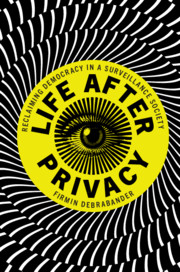Book contents
- Life after Privacy
- Life after Privacy
- Copyright page
- Contents
- Preface
- Acknowledgements
- 1 Confessional Culture
- 2 Defending Privacy
- 3 Big Plans for Big Data
- 4 The Surveillance Economy
- 5 Privacy Past and Present
- 6 The Borderless, Vanishing Self
- 7 Autonomy and Political Freedom
- 8 Powerful Publics
- Conclusion
- Index
1 - Confessional Culture
Published online by Cambridge University Press: 08 September 2020
- Life after Privacy
- Life after Privacy
- Copyright page
- Contents
- Preface
- Acknowledgements
- 1 Confessional Culture
- 2 Defending Privacy
- 3 Big Plans for Big Data
- 4 The Surveillance Economy
- 5 Privacy Past and Present
- 6 The Borderless, Vanishing Self
- 7 Autonomy and Political Freedom
- 8 Powerful Publics
- Conclusion
- Index
Summary
The current crisis of privacy is, or ought to be, especially surprising in the United States, because privacy concerns, historians and legal scholars attest, were a prime driver in the creation of the nation, and the erection and expansion of our basic freedoms. Our disregard for privacy is surprising for another reason: it defies predictions and expectations of how we are supposed to act under surveillance. Why, if we know we are watched – and we admit as much – is online behavior so shameless, seemingly open and free? Why do so many of us feel compelled to blare intimate details, and share mundane and embarrassing events with the whole world? What does that say about us? Is human nature changing before our very eyes, in the digital age, such that we show no compunction about living an utterly public life, in most all respects? How can we retain any enduring or grudging respect for privacy in this brave new world? Some people muster objections; some admit there is something wrong in privacy invasions – but what? We have a vocabulary of privacy, and a deep historical relationship to it (or so we are told), but hardly know what it means anymore, why it is of value, and worthy of defense. And in the digital age, privacy requires no modest or ordinary defense, but a monumental call to arms, to beat back the tidal wave of surveillance – which we invite, and facilitate.
- Type
- Chapter
- Information
- Life after PrivacyReclaiming Democracy in a Surveillance Society, pp. 1 - 20Publisher: Cambridge University PressPrint publication year: 2020



